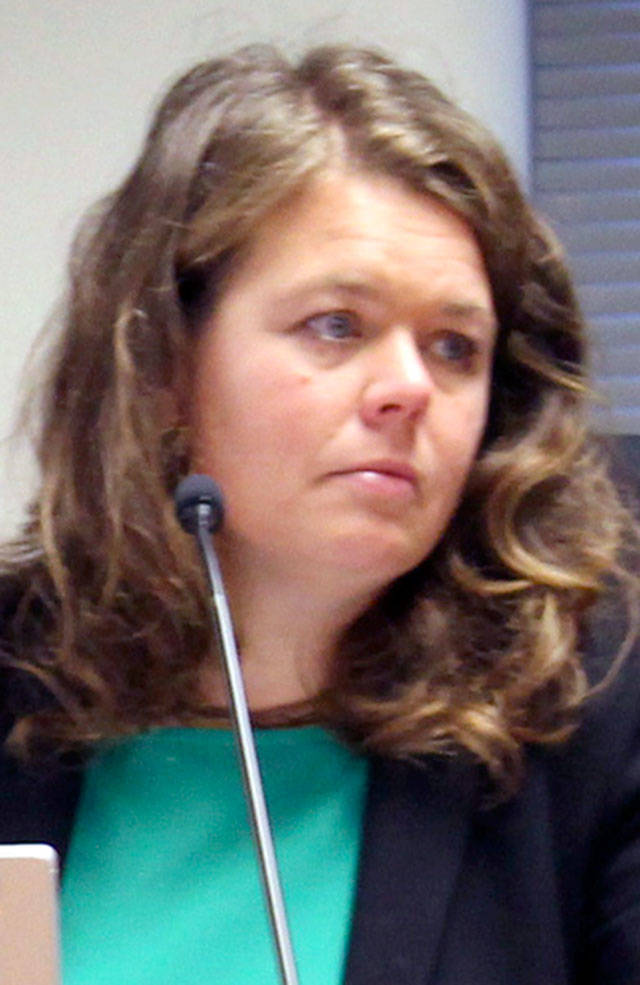PORT TOWNSEND — Replacing county public health departments with a regional system is the goal of two bills that have been introduced into the state Legislature.
That change would be a loss for both Clallam and Jefferson counties in regard to services, jobs and local involvement, according to the North Olympic Peninsula’s health officers and Jefferson County Commissioner Kate Dean, the newly elected Board of Health chair.
“I don’t know what that loss would look like,” Dean said. “I don’t want to scare people — but it’s inevitable.”
House Bill 1152 and Senate Bill 5173 were requested by Gov. Jay Inslee’s office as an attempt to “depoliticize” the county public health system, according to Dr. Tom Locke, Jefferson County health officer.
In some counties, health officers have been removed because of local disagreements with state COVID-19 prevention protocols and restrictions, Locke said. While most of the state’s public health jurisdictions are run by county governments, some are combined with smaller cities and smaller counties.
“In my opinion, it’s neither necessary or possible to remove politics from public health,” Locke said. “It would take a lot to convince me that moving the arena from local to state would eliminate politics from decisions.”
Locke, who has served as a health officer in Washington since 1987, briefed the Jefferson County Board of Health Thursday on the proposed bills, with Dean’s assistance.
Both were selected by the Association of Public Health Officials and the Association of Counties to join a joint task force discussing these bills as they move through the legislature.
Both bills were introduced on Jan.12. HB 1152 was referred to the Health Care and Wellness committee while SB 5173 was referred to the Health and Long Term Care committee.
The boundaries of the proposed health regions have not been outlined yet, but the bills say they must include a population of at least 250,000 that would be overseen by one health officer, Locke said.
The most likely region for Clallam and Jefferson would include Kitsap and potentially Mason counties, said Dean in a phone interview Wednesday.
While there may be changes to the legislation as it moves through various committees, as it’s currently drafted, it would move the main administrative services for each county to the largest county in the region — Kitsap for Clallam and Jefferson’s potential region — with smaller service offices located at the individual counties, she said.
If the legislation is approved, the regional health department would have a Board of Health comprised of one to two representatives of each county with one health officer overseeing all counties in the region, she said.
“The biggest concern is that we get to set priorities and policies at local levels that we may not be on the same page with other counties,” said Dean, who added that Jefferson County’s public health department is one of the largest county-run departments with an annual budget of $5 million.
“We have been a very progressive public health department with things like needle exchange, family planning, birth control for teens, things Mason County might not be in favor of.
“Politics are really driving this ship anyway you look at it.”
Dr. Allison Berry, Clallam County health officer, pointed to the current coordination between Kitsap, Jefferson and Clallam counties as a good example of how the separate jurisdictions have their own health officer and departments, but they’re able to communicate and assist each other as needed while staying focused on their specific county.
“The large population centers tend to draw a lot of the focus,” Berry said. “If we became a region of Kitsap, Jefferson and Clallam, Kitsap would become the primary focus of the work.
“So, if that does happen, it would be important that we advocate continued attention be paid to the needs of smaller communities and certainly that can be done if the leader of the organization is aware of the unique needs of the various parts of the region.”
That person wouldn’t be Locke.
“I would not work as a district health officer,” he said. “I think it’s very important that the health officer works for the Board of Health, not for the state government.”
Public health officials across the state are concerned about the proposed legislation, Locke said, since the governor’s office didn’t include them in the conversations regarding the changes and how it would affect the individual public health jurisdictions.
“We’re in the middle of the worst public health emergency in the last century and so we don’t have a lot of time available to be talking fundamental reorganization of the system, especially if it doesn’t enhance our pandemic response right now,” Locke said.
He and other health officials testified Thursday morning in a House committee meeting regarding the proposed legislation. During his county board of health briefing later in the day, Locke paraphrased what Kitsap County Public Health Administrator Keith Grellner said during the hearing.
“Requiring us to spend a lot of time reorganizing the system this year in the midst of a pandemic is not a request that we’ve been looking for.
“We’re more than busy with a national health emergency and these task force and committees to reorganize the system this year is something we simply don’t think we’re going to have time for.”
The two bills can be read and their current status found at https://tinyurl.com/PDN-HB1152 for HB 1152 and https://tinyurl.com/PDN-HB5173 for SB 5173.
________
Jefferson County reporter Zach Jablonski can be reached at 360-385-2335, ext. 5, or at zjablonski@peninsuladailynews.com.

